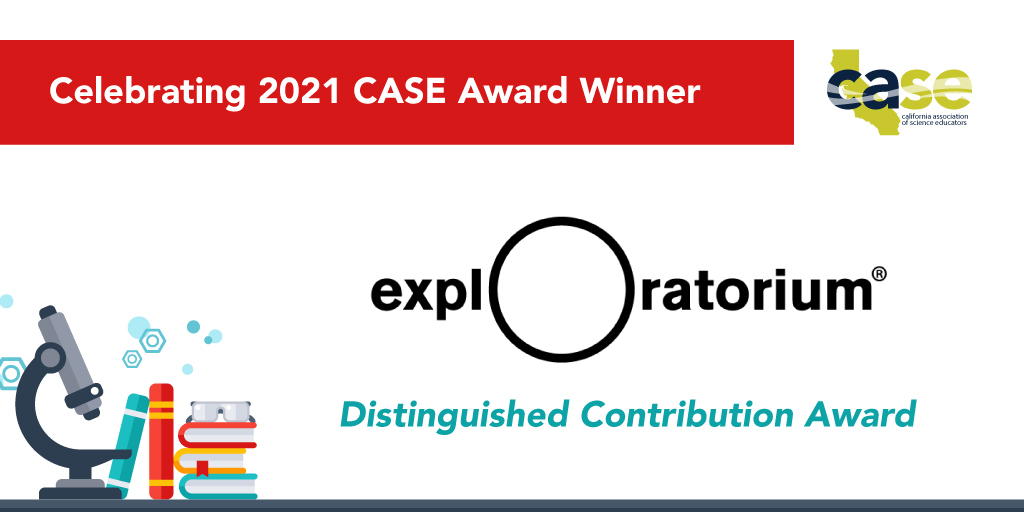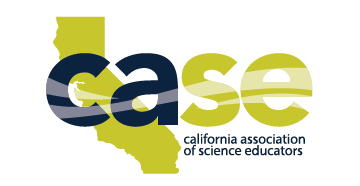
Distinguished Contribution Award: Exploratorium
- Awards Program Nominations
- 2024 Awards Winners
- 2023 Award Winners
- 2022 Award Winners
- 2021 Awards Recognition
- Future Science Teacher Award: Lili Gallegos
- Jessica Sawko Teacher Leadership Award: Philip Hudec
- Margaret Nicholson Distinguished Service Award: Laura Henriques
- Administrator Leadership Award: Sharon Matsuzaki
- Legislator Award: Senator Ben Allen
- Distinguished Contribution Award: Exploratorium
- Distinguished Contribution Award: Yuba Water Agency
- 2020 Awards Recognition
Exploratorium

Tell us about your recent involvements in science education.
The Exploratorium has been a professional home for phenomena-based learning for over 40 years. Since 2016, we have been working to build a K-12 Science Leader Network among science educators by partnering with county offices, district leads, and teacher leaders who serve as local advocates throughout the state, equipping educators with high-quality, NGSS-aligned science resources in order to strengthen science instruction at all levels.
More recently, the Exploratorium has engaged with the California Partnership for Math and Science Education (CAPMSE) in an effort to answer the Call to Action for Science Education issued by the National Academies of Sciences, Engineering, and Medicine. The report outlined “a vision for equitable access to quality science learning experiences across K-16 education” while recognizing “that many students, particularly students who live in poverty, Black, Latino/a, and Indigenous students, and students living in rural areas, have lacked access to high-quality science education across K-16 and have been shut out of many opportunities in STEM” (pgs. 7-8). As a diverse and innovative state, California should be investing in and prioritizing “better, more equitable science education.” The Exploratorium issued a survey to over 500 California science educators, seeking their suggestions for creating equitable science education in California K-12 schools. In October 2021, a planning group of about 40 will convene to analyze and synthesize the results of this survey, and create a set of recommendations and policy priorities that will be delivered to California policymakers.
What do you think the long-term benefits of these involvements will bring for science education?
Our goals and aspirations with our professional learning programs, leadership network, and our upcoming convening are to help California promote high-quality, equitable science education for all students. We are focused on strengthening leadership for science education and improvement in diverse local contexts across the state, and believe that building coalitions and networks of support are the way to achieve the greatest impact. Through convening a diverse group of science educators, we hope to build a coalition and act as a strong, unified, informed voice for equitable K-12 science education in Sacramento and across local contexts.
How has the COVID-19 pandemic changed your involvement with science education?
The rapid shift to online learning because of the COVID-19 pandemic meant that we, at the Exploratorium, had to quickly adapt in order to be relevant and responsive to science teachers and leaders in California. We learned that one of our greatest strengths during shelter-in-place was as a connector and mediator of peer relationships. As such, we offered numerous professional learning opportunities—affinity spaces, online communities of practice, and collaboration time in our workshops—for science teachers and leaders to rely on one another as resources.
We also spent time curating new and timely resources like a learning toolbox with videos and activities that helped explain different aspects of the COVID-19 virus, a video series, Hungry for Science, exploring the science of cooking, and even a video series that allows people to re-create Exploratorium exhibits at home. We also have over 300 Science Snacks, teacher-tested, hands-on activities to engage in phenomena, sense-making, and the science and engineering practices (SEPs) which are easily searched by grade bands (K-2, 3-5, 6-8, 9-12) or by DCI (such as LS1 or PS1), and some are available in Spanish. Additionally, our Watch and Do Science videos are designed for K–5 teachers to use with their students in virtual or in-person environments, with minimal prep time and common household materials. Our Tools for Teaching and Learning page features a full list of our resources developed for teachers.
The pandemic era also gave us the opportunity to think deeply about what it means to teach science with an equity lens. The Exploratorium is working toward a vision of anti-racist science education which provides opportunities for all individuals and communities to investigate the world around them by asking and answering their own questions. The Exploratorium’s teaching programs focus on creating equitable, inquiry-based science education experiences for all students, in all classrooms.
What do you think the future holds for the Exploratorium?
At the Exploratorium, we believe in the power of people to ask questions, to inquire, to investigate, and to learn, and science is a process for engaging those questions, inquires, and investigations to better understand our natural and designed world. To survive and thrive in our changing world we will all need to be good noticers, questioners, and have the tools to build confidence in our own capacity to think and reason for ourselves. We are looking ahead and considering how we can create learning experiences that are inclusive, welcoming, and focused on helping all of us develop trust in our own inherent capacity to discover and learn.
The challenges and opportunities we face—such as addressing climate change and working towards equitable K-12 education—demand more collaboration and connection, require embracing complexity and leading with empathy, and must be based on equitable and anti-racist practices and policies.
As we look ahead, we remain committed to supporting K-12 educators and their needs: we will continue to offer free and low-cost professional learning opportunities and free admission to the museum for California public school teachers. We’re focused on expanding our networks, growing our collaborative community of practice, and increasing our support of science teachers with more resources and professional learning opportunities. We do our best work when we collaborate with educators, organizations, and leaders to ensure that all students are engaged as active and curious science learners
What significance does this award hold for your organization?
It is an extraordinary honor for our organization to be recognized with this award from CASE. Not only is the CASE organization a tireless advocate for science and NGSS standards, but it is also a tremendous resource for educators across the State. To be honored by an organization as impactful as CASE is deeply meaningful to us.
Quick Links
Exhibit Partner Package
Opening Soon
Join us at the 2025 California Science Education Conference, the premier event for science educators across California! This gathering is your chance to showcase your products, engage with educators, and maximize your impact through our exclusive Partner Program.

